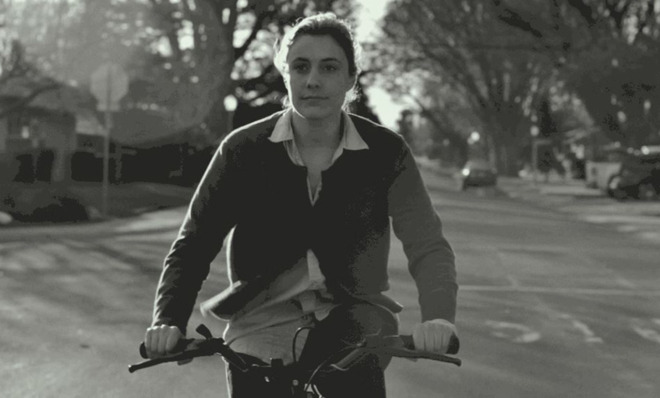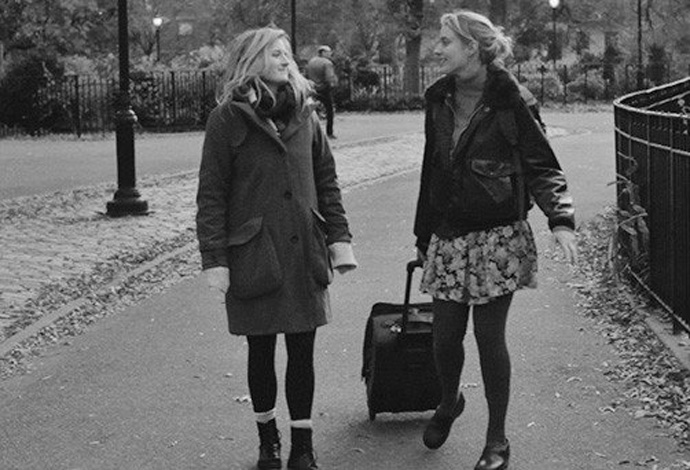Girls on Film: Frances Ha and the art of living
The acclaimed film, which is available on both DVD and Netflix Instant this week, is a celebration of "the dance of life"


A free daily email with the biggest news stories of the day – and the best features from TheWeek.com
You are now subscribed
Your newsletter sign-up was successful
"The art of living is based on rhythm — on give and take, ebb and flow, light and dark, life and death. By acceptance of all aspects of life, good and bad, right and wrong, yours and mine, the static, defensive life, which is what most people are cursed with, is converted into a dance, 'the dance of life,' metamorphosis. … The acceptance of the situation, any situation, brings about a flow, a rhythmic impulse towards self-expression. To relax is, of course, the first thing a dancer has to learn."
— Henry Miller
The dance of life is one of the most dynamic concepts cinema can capture — and unfortunately, the one it most often fails to reveal. Instead of layered explorations of "all aspects of life," Hollywood tends to saddle us with countless explorations of the same basic constructs: Films that abolish any commitment to character, and where motivations and rationale are secondary to the motions needed to cross the three-act finish line.
Too rarely does a film manage to break through the monotony — to focus on character rather than construct. But when a film does focus on human impulse rather than screenwriting stereotypes, the effect is powerful. Nothing hits as deeply as the impact of personal resonance, and Frances Ha — which hit shelves this week in a slick Criterion release, and is also available to stream on Netflix Instant Watch — is a flawless reminder of the power of character and the timelessness of real human experience.
Frances (Greta Gerwig) is a twenty-something in love. She isn't in love with herself, her doting boyfriend, the dance troupe she wants to join, or the romantic version of Manhattan in which she lives. Frances is in love with her best friend, Sophie (Mickey Sumner). Their bond isn't sexual; it's the co-dependent love that comes with ultimate familiarity — of being so in sync with another person that you have your own way of speaking, your own way of navigating life. They're not beholden to any stereotypical paradigm; they wrestle, read, exercise, cook, cuddle, drink, busk, and rest together. They are the picture of happy co-dependence until Sophie finds an opportunity to take a step forward. What follows is a comedy of missteps as each woman tries to figure out how to be true to both herself and her "person" as their lives start moving at different speeds.
The Week
Escape your echo chamber. Get the facts behind the news, plus analysis from multiple perspectives.

Sign up for The Week's Free Newsletters
From our morning news briefing to a weekly Good News Newsletter, get the best of The Week delivered directly to your inbox.
From our morning news briefing to a weekly Good News Newsletter, get the best of The Week delivered directly to your inbox.

Sophie is terrible at confrontation. She can't manage the balance between friend and lover, downplaying her new romance with Patch ("He's a nice guy … for today") out of a misguided sense of loyalty, eventually scrambling in her friendship with Frances as the evolution of her relationship becomes obvious. When Sophie decides to move in with him, and then move to Japan with him, she is forced to come clean to Frances about her growing feelings for Patch and the life they are making together.
Frances, meanwhile, is forced to deal with all the ramifications of sudden loneliness. The loss of Sophie's influence as best friend and roommate forces Frances to examine every aspect of her life. It begins with the simple — a cold, empty apartment that shows Frances how little she has — and quickly expands to the more complex. She can't afford to live on her own, which leads her to jumping from casual friend to casual friend, each of whom illuminate the stagnancy in her life and career. She has no money, no steady job, and most importantly, no one that speaks her language. She's isolated in a cacophony of people who seem to have it together and don't understand her, and she must find a way to express herself and find a way in life.
This isn't so much a case of Frances learning a life lesson that changes her into a new kind of person — as a more conventional film might showcase — but the story of a young woman who has to learn the subtleties of communication and the capabilities within herself. This isn't about Frances changing; nor is it about Frances staying the same. The film is about her figuring things out, and learning to accept herself and discover strength she doesn't realize she already has.
In one of the film's most powerful scenes, Frances attends a dinner party with wealthy, successful professionals. They speak a different life language then her own, and she soldiers on as the eternal Candide in her messy life: Awkward but determined to meet all manner of struggle with a wobbly smile on her face. But the scene isn't only about the awkwardness inherent in interactions where you are not as professionally successful as the people surrounding you — it's about the power of genuine communication, and being able to recognize the moments when you do connect with the people who seem to be out of your league.
A free daily email with the biggest news stories of the day – and the best features from TheWeek.com

"I want this one moment," Frances begins, her voice breaking before the overwhelming desire to have this moment makes her voice clear and strong — yet still tinged with just the slightest hint of a choked delivery. She bares all, and after revealing so much, she nervously retreats, making light of the desire, swearing she's not stoned. She's oblivious to the interest on her audience's face. Frances has finally connected, and she doesn't notice. Instead, she once again makes herself the weird outsider, announcing her plans to go to Paris. Her naïve attempt to have the worldliness of this group of people, to feel on the same level as her estranged best friend who's headed to Japan, ultimately masks what really made her the same level for a fleeting moment: Her insights.
Frances Ha's soundtrack, an infectious set of tunes mostly taken from legendary French New Wave films, is tossed aside precisely as Frances goes broke and hits Paris — that cinematic scenario that always becomes the enriching and enlightening experience for everyone else. "I chose Paris to some degree, because, in another movie, this would be the transformative trip for her character," director Noah Baumbach explains.
Her trip is a disaster — not in that Meet the Parents way where one flub leads to a deluge of increasingly audacious slapstick catastrophes, but rather in the most mundanely frustrating and real way. She sees darkened buildings, not the shining Eiffel Tower. Frances sleeps through most of her day in Paris, her timing off on every plan. She can't get into a movie, finds a bookstore after it closes, and doesn't hear back from her local friend until she's headed for the airport. The magic isn't in a city, or a magical paradigm Hollywood loves to display. It's in herself, if she can manage to look, and she will only find it when she stops avoiding the inevitable changes of life.

It's not an immediate realization and decision. It's just a step towards the future as Frances still fumbles along, noticing just how far she has evolved outside of university life: How Sophie is still messed-up best friend Sophie, in a new relationship but still struggling like everyone else, and how there isn't a specific way to do things that's mature or immature. When Frances looks down at her bare feet, the limbs for her dancing, she finally begins to see the rhythm in the 'art of living' and choreographs it.
Henry Miller died over 30 years ago, but the quote above feels like it was written for Frances Ha — because for all the hipster twists and twenty-something angst, the film is a timeless collection of life that is both fresh and universal. Modern life mixes with the old without irony, the way every person is a collection of idiosyncratic mirrors of the past and present. From the French New Wave to Leos Carax's gorgeous "Modern Love" dance from Mauvais Sang, Noah Baumbach accentuates the timelessness of life, and of art.
Frances Ha isn't about friendship any more than it's about Manhattan, romance, or self. It's about the snowflake of life: So unique that no two are alike, but so similar that every single one is recognizable.
It's a look at the romance of friendship, but it's also about the discovery of self, the highs and lows of co-dependency, the pressure of public expectations, the process of finding the middle ground in the push and pull of life, the intricacies of confrontation, the way the past intermingles with the present, the clash of desire and commitment, the difficulty of maintaining optimism in the face of defeat, the strength and weakness in us all, and, of course, what a "happy" ending really means. Frances Ha is all of these and more because it is the "acceptance of all aspects of life."
We hear many stories of studios manipulating films to appeal to the largest possible audience. But engagement isn't a matter of carefully whittled storytelling; it's the result of speaking about life — whether in a simple rural drama or a wild space adventure — so deeply and thoroughly that we, the audience, feel the irresistible rhythmic impulse to engage.
(And while Frances Ha is worth watching in any medium, there are extra reasons to check out the Criterion release. Alongside numerous other insightful special features, there is a must-watch conversation between director Sarah Polley and Gerwig that offers great insights into the film and creation of the titular character — including the impact of the film, and how it can impart everything from "unmitigated joy" to "penetrating loneliness"; the quality of aloneness; and the subtleties of a character’s interactions.)
Girls on Film is a weekly column focusing on women and cinema. It can be found at TheWeek.com every Friday morning. And be sure to follow the Girls on Film Twitter feed for additional femme-con.
Monika Bartyzel is a freelance writer and creator of Girls on Film, a weekly look at femme-centric film news and concerns, now appearing at TheWeek.com. Her work has been published on sites including The Atlantic, Movies.com, Moviefone, Collider, and the now-defunct Cinematical, where she was a lead writer and assignment editor.
-
 Why is the Trump administration talking about ‘Western civilization’?
Why is the Trump administration talking about ‘Western civilization’?Talking Points Rubio says Europe, US bonded by religion and ancestry
-
 Quentin Deranque: a student’s death energizes the French far right
Quentin Deranque: a student’s death energizes the French far rightIN THE SPOTLIGHT Reactions to the violent killing of an ultraconservative activist offer a glimpse at the culture wars roiling France ahead of next year’s elections
-
 Secured vs. unsecured loans: how do they differ and which is better?
Secured vs. unsecured loans: how do they differ and which is better?the explainer They are distinguished by the level of risk and the inclusion of collateral
